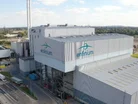How is enfinium Improving Plant Efficiency with AI?

AI is known to increase operational efficiency across a variety of sectors, whether automating tasks, analysing data, predicting trends or optimising processes.
The energy-from-waste (EfW) industry is also feeling the benefits of artificial intelligence.
For example, enfinium has partnered with energy data company Cognitive Business to implement cutting-edge AI technology across its operational facilities to improve plant efficiency, availability and reliability. This, in turn, will optimise and maximise uptime, enfinium hopes.
Transforming EfW operations with advanced AI
Advanced AI is revolutionising EfW operations by enhancing efficiency, reliability and sustainability.
Technologies like Advanced Pattern Recognition (APR) analyse vast amounts of operational data to detect potential issues early, predict equipment failures and optimise maintenance schedules.
enfinium’s trial of APR technology will take place at its four facilities.
- Ferrybridge 1
- Ferrybridge 2
- Kemsley
- Parc Adfer
By utilising extensive amounts of operational data, this application of technology seeks to optimise plant performance and maximise uptime.
Benefits of implementing APR technology include:
- Early detection of issues: The technology enables the identification of potential operational problems before they escalate
- Predictive maintenance: It enhances the accuracy of predicting equipment failures, allowing for timely interventions
- Optimised scheduling: Maintenance schedules can be fine-tuned for improved efficiency
- Enhanced reliability: Overall plant availability is expected to rise significantly.
As well as this, AI-powered computer vision systems act as additional monitors, identifying non-conforming items in waste streams to prevent blockages and unplanned shutdowns.
By automating repetitive tasks and providing real-time insights, AI allows operators to focus on higher-value activities.
Trailblazing AI in the EfW sector
The partnership between enfinium and Cognitive Business represents a significant leap forward in applying AI and data analytics to waste management and climate technology’s use in this space as a whole.
Chris Bebbington, Group Head of Asset Management at enfinium, says: “Our aim is to pioneer trailblazing technology in the EfW sector, adopting forward-thinking and innovative solutions that enable us to improve the performance of our day-to-day operations.
“Cognitive Business are industry-leading for advanced analytics and AI and this partnership aligns with our vision to use AI and big data analytics to manage our facilities more effectively.”
As these technologies and the way in which they are applied continue to evolve, they promise to further optimise resource utilisation, reduce emissions and increase energy output from EfW facilities.
What is enfinium?
enfinium is the largest pure play waste-to-energy business in the UK and converts non-recyclable residential and business waste into heat and partially renewable power.
This is in light of stats that show that the UK currently recycles 45% of its waste, with more than 40% of non-recyclable waste still being sent to landfill.
To combat this problem, enfinium’s facilities convert waste into power for the National Grid, playing a valuable part of the UK’s circular economy and showing the success of waste management solutions.
enfinium’s AI trial with Cognitive Business is part of enfinium's larger strategy to transform its facilities into local decarbonisation hubs.
The company aims to utilise millions of tonnes of non-recyclable waste produced in the UK to generate energy for homes, contribute to heat networks and produce electrolytic hydrogen.
And its investment in and application of climate tech doesn’t stop there. Earlier in 2024, the company unveiled plans to invest around £200m US$260m) in carbon capture and storage (CCS) technology at one of its facilities in Wales.
enfinium’s CEO Mike Maudsley says: “Today, enfinium uses waste that cannot be recycled — which would otherwise go to climate damaging landfill — to generate low carbon homegrown energy.
“Installing carbon capture technology will allow us to go further and remove more than one million tonnes of carbon dioxide from the atmosphere every year.
“Carbon removals is a once-in-a-generation opportunity for the waste sector globally. With bold leadership and in partnership with governments we can pioneer a credible and affordable pathway to zero emissions and green growth.”
Receive the next edition of ClimateTech Magazine by signing up for its newsletter.
As part of this portfolio, make sure you check out Sustainability Magazine and also sign up to our global conference series - Sustainability LIVE.
Also check out our Sister Brand, Energy Digital.

